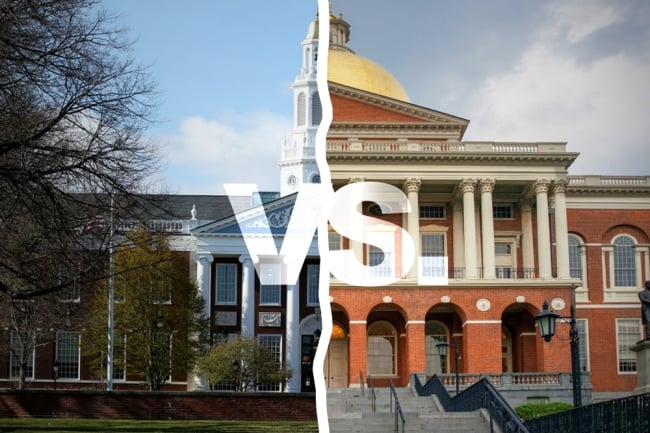You have /5 articles left.
Sign up for a free account or log in.

Harvard University, left, would pay a special tax on its endowment under a Massachusetts bill that seeks to penalize colleges using legacy admissions. Its just one of a slew of new measures targeting alumni preferences.
Photo illustration by Justin Morrison/Inside Higher Ed | Getty Images
As scrutiny over legacy admissions intensifies in the wake of the Supreme Court’s affirmative action ban, lawmakers have been emboldened to target the practice through legislation designed to prohibit it or penalize colleges that use it.
Proposals from Democratic state legislators in New York and Connecticut seek to ban the practice outright at public and private institutions in their states. Legislators in other states, including Pennsylvania and California, have promised to introduce similar legislation in upcoming sessions.
A bill currently moving through the Massachusetts statehouse takes a less direct approach. Rather than ban legacy admissions, it would establish a tax for institutions that use it, channeling the revenue to a public trust fund for community colleges.
The tax would be calculated based on each institution’s endowment, meaning some of the state’s private colleges would contribute significant sums. Harvard University, for example, has the world’s largest endowment, at $50 billion. Harvard’s legacy policy is also the subject of an ongoing federal civil rights investigation.
Regardless of the approach, the pending legislation all aims to address the potential effects of the affirmative action ban by prohibiting another admissions practice that, according to numerous studies, disproportionately benefits wealthy white applicants. Latrice Walker, a member of the New York State Assembly and a sponsor of the state’s Fair College Admissions Act, said the legislation aims to “eliminate structural barriers” erected by legacy preferences at selective private colleges, and that the affirmative action ruling presents lawmakers with the impetus to pass it.
“Legacy preference is inherently racist, providing an unfair advantage almost exclusively to affluent white applicants,” she wrote in an email to Inside Higher Ed. “The bill takes on added urgency given the recent Supreme Court decisions that effectively dismantled affirmative action with respect to college admissions.”
Johanna Miller, director of the New York Civil Liberties Union’s educational policy center, said the FCAA, which was first proposed in April, got a “huge boost” from the Supreme Court’s affirmative action ruling.
“The unfairness of legacy admissions is under a microscope now,” she said. “This legislation is going to create a sense of accountability for colleges. Maybe they’ll decide to do the right thing, maybe they’ll fight it. But it’s getting more uncomfortable for them to do that.”
Richard Kahlenberg, a nonresident scholar at Georgetown University’s Center on Education and the Workforce and the editor of a book on legacy admissions, Affirmative Action for the Rich (Century Foundation, 2010), said the latest spate of state legislation grew out of the public outcry over the affirmative action ban.
“These are mostly blue states where legislation is being considered, where there’s a lot of anger over the Supreme Court decision on affirmative action. This is one way to respond to that,” he said.
The states with legislation on the table are also home to a number of highly selective institutions—including Stanford in California, Harvard in Massachusetts, Columbia in New York and Yale in Connecticut.
“That means the impact will be bigger there, of course. But it also means a more powerful alignment of interests battling against it,” Kahlenberg said.
He called it a positive sign that legislation is gaining any traction at all—a fact he attributes at least in part to the dissolution of the mutually supportive relationship between race-conscious admissions and alumni preferences, in which the existence of one inversely justified the other.
“For a long time we got nowhere in moving the needle on this issue because of the unholy alliance between advocates of race-based affirmative action and legacy preferences,” he said. “But now that that’s no longer a factor, the logjam has broken.”
Breaking the Logjam
Legislation targeting legacy admissions preferences has a long and largely unsuccessful history in the U.S. In 2003, Sen. Ted Kennedy introduced a bill that would have required colleges to report demographic and socioeconomic data on their legacy admits, but it failed to pass.
The movement received a burst of life in 2019 with the Varsity Blues scandal, in which wealthy and famous parents dominated headlines for paying for an admissions leg-up for their children at selective institutions. But even that didn’t translate to successful legislative bans.
In California, where the University of Southern California was at the epicenter of the scandal, state assemblyman Phil Ting introduced a bill in 2019 to eliminate alumni preferences across the state. That version failed to gain traction after vigorous opposition from the state’s private colleges. A revised version requiring colleges to release data on the number and demographics of their legacy admits—similar to Sen. Kennedy’s 2003 proposal but on a state level—did pass, and its success has given more transparency to legacy admissions in California than almost anywhere in the country. But the push fell short of prohibition.
The only successful legacy ban to pass in recent years was in Colorado in 2021. But the state has few highly selective public institutions that valued legacy; one of the few that might have been affected, the University of Colorado Boulder, had ended its legacy policy the year before, and private colleges were exempt from the law.
Such history makes Kahlenberg skeptical of the bills’ potential to succeed even in the most progressive states. Higher ed special interest groups have time and again prevailed in quashing any attempt, he said, and they retain a powerful influence in state legislatures.
“I’m encouraged by the momentum of this movement. I am unsure, however, about the prospects of these bills; when you go through legislatures, you have to confront special interest groups, which have been largely successful in the past at stamping them down,” he said.
There is still fierce opposition to bills banning or penalizing legacy admissions. Rob McCarron, president of the Association of Independent Colleges and University of Massachusetts, said the organization is categorically against the legacy tax bill introduced in the state legislature, as well as any other attempts to mandate admissions policy changes via legislative decree.
“Admissions policies used by our institutions are as varied and diverse as the institutions themselves,” he wrote in an email. “Any effort that seeks to impose a punitive and likely unconstitutional tax on a college’s endowment is concerning and reflects that many do not understand exactly what a college endowment is, what it is not, and how it can be used.”
But that opposition is waning. Last month the Commission on Independent and Universities, which represents private colleges in New York state, dropped its opposition to a legacy admissions ban.
“Legacy admission has been an important recruitment tool for some New York colleges,” the commission wrote in an email to the New York Daily News. “[But] we recognize the public’s perception that the practice also has the effect of expanding privilege instead of opportunity.”
Some lawmakers are taking advantage of this shift to resurrect their legacy regulation efforts. In July, Ting reintroduced the original 2019 version of his legacy bill in California, proposing a denial of state funds to colleges that use the practice. And at the federal level, congressman Jamaal Bowman and senator Jeff Merkley have reintroduced their 2022 bill to deny federal aid to colleges with alumni admissions preferences.
While reserving his doubts, Kahlenberg conceded that if there were ever a time when the pressure overwhelmed legacy’s defenders, it’s now.
“Given the earthquake of the Supreme Court decision, who knows,” he said. “This might be it.”





